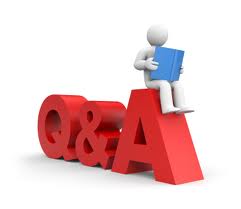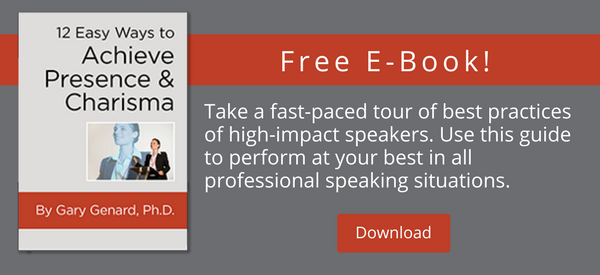
How long does it take an audience to judge your worth as a speaker?
The estimates I’ve seen range from six seconds concerning judgments based on your appearance, to 30-60 seconds based on what you’re saying. Not much time, is it?
Ready to go beyond run-of-the-mill speeches and presentations? To make both you and what you say memorable every time you speak, download my essential cheat sheet, "5 Ways to Captivate an Audience." Start becoming an extraordinary speaker today!
Once your audience makes those initial judgments, it’s up to you to strengthen them or change them. And that’s where your authenticity as a speaker comes into play. Whoever your audience is and whatever you’re speaking about, your listeners are always in a “What’s in it for me?” frame of mind.
So how can you reassure them that you’re the real thing: Someone who knows what he or she is talking about and is worth listening to? Below are five ways to establish and maintain thebona fides of authoritative speaking in the minds of your audience.
1. To Speak for Leadership, Grab Your Audience from the Start
Authenticity is a speaker characteristic that announces itself quickly. That’s partly an intuitive response from your audience based on the way you generally look and sound. The rest, however, is up to you.
To be seen as authentic in that critical first 30-60 seconds, aim to grab your audience immediately. Mediocre speakers follow well-trodden paths of how presentations like theirs are always done. But you need to show that you’re the genuine article in terms of performance—a speaker who knows how to hold an audience in the palm of your hand. For powerful ways you can do this, see my blog “How to Start a Speech—12 Foolproof Ways to Grab Your Audience!”
TED is another great resource to understand how authoritative speakers hook their audience’s attention (or fail to do so). Go to TED.com and sample this rich resource. As examples, here are some opening lines from TED talks, powerful and otherwise:
- David Gallo in “Underwater Astonishments”: “We’re going to go on a dive to the deep sea.” — Who wouldn’t want to participate in the adventure?
- Deborah Gordon in “What Ants Teach Us About the Brain, Cancer, and the Internet”: “I study ants: in the desert, in the tropical forests, and in my kitchen.” — Why should we care? (We learn in a moment how complex ant ecosystems can be related to the human brain and to cancer, which is interesting.)
- Sir Ken Robinson in “How Schools Kill Creativity”: [Referring to previous speakers.] “It’s been great, hasn’t it? I’ve been blown away by the whole thing. . . . In fact, I’m leaving.” — Humor? Always a winner if you can pull it off.
- Aubrey de Grey in “A Roadmap to End Aging:” “Eighteen minutes is an absolutely brutal time limit, so I’m going to dive right in, right to the point where I get this thing [the hand-held remote] to work.” — Is it a good idea in terms of establishing authenticity to start out complaining, then reveal you’re not familiar with the presentation technology?

2. To Develop Charisma, Live in Your Audience’s World
An authentic speaker is someone who invites the respect of an audience while not seeming to expect it. By that I mean, you need to show you’re more concerned with your audience’s needs than your own.
Most presenters are “speaker-centric”: they’re concerned with how they look and sound, with doing a good job. Authentic speakers leave that decision to the audience. They share what they believe the audience would like to know or needs to know. The audience can make up their mind from there.
To make this happen the way it should, conceive and deliver your talk in terms of your listeners not yourself. Live in their world, so they can relate to the information you’re there to deliver. Make yourself present a picture they’ll understand, from the vantage point they’re starting out with and with references and examples they’ll relate to. Above all, ask yourself: “Am I making clear why all of this matters to my listeners’ lives?”
3. To Be Memorable, Surprise Your Audience
There’s a piece of advice on writing mystery fiction I read many years ago and that I’ve liked ever since: “Include a surprise every twenty pages, and a shock every fifty.” The mystery writer who follows that advice will certainly create an authentic voice!
Do you see how the same general rule can help your public speaking? Most presentations are nearly identical to all the others in that industry or field. Speakers play it safe so they’ll survive with their skin intact, not realizing that they sacrifice memorability and authenticity in the process.
If you surprise your audience instead, you will delight them. Remind yourself of how it’s always been done, then find another way. From the structure of your talk to the technology you employ to the stories you tell, create your own approach. Emulate the artists in Chinese brush painting who only apply their stamp to the page when they’ve created something unique. Be as incremental or bold in your approach as you like, depending upon your comfort level with risk. Here are some ways you can amaze your audiences in pitches, speeches, and presentations:“On-Stage Magic: How to Transform Your Public Speaking.”

4. To Engage and Persuade, Tell an Authentic Story
The advice here is two-fold: First, tell stories; and second, tell authentic ones.
Nothing is less involving for an audience and less demonstrative of authenticity than the dry recital of data by a speaker. Our minds perceive separate pieces of information as a list, and we quickly reach the limit of what we can retain. Are we to blame, then, if we think of such a speaker as boring, and more concerned with content than with his or her audience?
Authentic presenters speak from experience—and the audience needs to know they have skin in the game. Some speakers think they shouldn’t inject themselves and their own stories into their speeches; but just the opposite is true. You should tell the audience why all of this is important in your own mind. It’s part of what makes you authentic. However specific and technical the information you share with audiences, emotion is always part of the mix. Listeners want to hear your passion for your topic. Frame your argument as a story and the narrative will drive itself forward, taking the audience along—with you as their authentic guide.
Looking to inspire and motivate your listeners? The intriguing stories you’re looking for may be a lot closer than you think! Read my blog “Want to Tell Great Stories as a Speaker? — Here’s How!”

5. To Clinch the Deal, Nail the Q & A
Think a great presentation is what brands you as an authentic speaker? Not necessarily. Follow the advice above and you’ll boost your authenticity. But how you handle the Q & A might just seal the deal.
In my book How to Give a Speech, I call Q & A “The forgotten avenue of audience persuasion.” If you deliver a rock-solid presentation, your audience will undoubtedly appreciate it. At the same time, every listener will know that your presentation was prepared and practiced beforehand; but that like every speaker, you couldn’t know what was coming in the Q & A that follows.
Now come the unexpected questions; the question seemingly too tough to answer; the pontificating questioner; and the hostile audience member who launches an ad hominemattack. How will you deal with all of that and more?
Here’s where your authenticity may announce itself in the strongest voice, as you handle yourself with wit, deep knowledge, and style. As I say to my clients at The Genard Method, anyone can give a reasonably good presentation with enough preparation and practice. But who will prove their expertise amid the tougher demands of Q & A?
So get ready. When you’ve gathered enough content, stop the process, and turn your attention to your performance. Prepare to answer topics not questions (which keeps you in too much of a reactive mode); and use every opportunity to make the points you came there to discuss. Remind yourself that you’re naked and vulnerable and there’s nothing you can do about that. Answer the best way you can each time, letting the audience see the real you as you deal with them and their concerns honestly and openly.
Authenticity. There’s nothing like it in an audience’s mind.
You should follow me on Twitter here.



